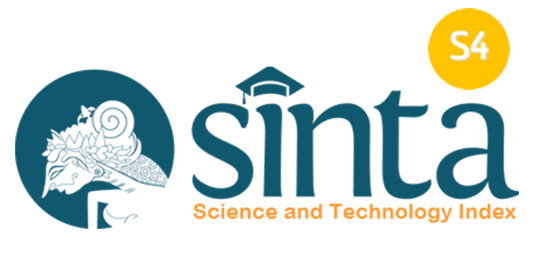EFFECTS OF DHIKR ON SPIRITUALITY AND CORTISOL LEVELS AMONG PATIENTS WITH HEART FAILURE: A PILOT STUDY
Downloads
Introduction: Depression and anxiety are common comorbid conditions in patients with heart failure (HF). Spirituality was found to have a positive impact on patients' mental health status. However, whether the spiritual practice affects physiological modulation is still questionable. Therefore, this study aimed to analyze the effect of dhikr as spiritual practice on spirituality and cortisol levels among patients with HF. Methods: A quasi-experiment was used in this study. A sample size of 18 respondents consists of 9 respondents of the control group and 9 respondents of the treatment group. Dhikr intervention was conducted in three meetings with an interval of two days during patients' hospitalization. Spirituality was measured using a spirituality questionnaire, whereas the cortisol levels with venous blood sampling, measured by the enzyme-linked fluorescent immunoassay (ELFA) method. Statistics analysis in this study was using t-Test for spirituality, Mann Whitney and Wilcoxon Sign Rank Test for cortisol level with a significance level of α<0.05. Results: The results showed that dhikr improves the spirituality of HF patients (p=0.000) and decreases the level of cortisol (p=0.015) significantly. Dhikr interventions appears to strengthen spirituality in patients with HF by improving stress perception which further modulates the adaptive stress response in the form of decreasing cortisol levels. Conclusions: Dhikr could be one of the spiritual nursing interventions to improve spirituality and stress hormonal modulation in patients with HF.
Aburuz, M. E. (2018). Anxiety and depression predicted quality of life among patients with heart failure. Journal of Multidisciplinary Healthcare, 11, 367–373. https://doi.org/10.2147/JMDH.S170327
Aggelopoulou, Z., Fotos, N. V, Chatziefstratiou, A. A., Giakoumidakis, K., Elefsiniotis, I., & Brokalaki, H. (2017). The level of anxiety, depression and quality of life among patients with heart failure in Greece. Applied Nursing Research, 34, 52–56. https://doi.org/https://doi.org/10.1016/j.apnr.2017.01.003
Benjamin, E. J., Blaha, M. J., Chiuve, S. E., Cushman, M., Das, S. R., Deo, R., De Ferranti, S. D., Floyd, J., Fornage, M., Gillespie, C., Isasi, C. R., Jim’nez, M. C., Jordan, L. C., Judd, S. E., Lackland, D., Lichtman, J. H., Lisabeth, L., Liu, S., Longenecker, C. T., Muntner, P. (2017). Heart Disease and Stroke Statistics’2017 Update: A Report from the American Heart Association. Circulation, 135(10), e146–e603. https://doi.org/10.1161/CIR.0000000000000485
Bormann, J. E. (2005). Frequent, Silent Mantram Repetition: A Jacuzzi for the Mind. Top Emerg Med, 27(2), 163–166.
Chapa, D. W., Akintade, B., Heesook, S., Woltz, P., Friedmann, E., Hartung, M. K., & Thomas, S. A. (2014). Pathophysiological Relationships Between Heart Failure and Depression and Anxiety. Critical Care Nurse, 34(2), 14–24.
Jauhari, J. (2014). Pengaruh Terapi Psikoreligius: Doa dan Dzikir terhadap Penurunan Tingkat Depresi pada Penderita Gagal Ginjal Kronik yang Menjalani Hemodialisa di Ruang Hemodialisa Rumah Sakit Kota Semarang. Skripsi. Semarang: STIKES Ngudi Waluyo Ungaran.
Newberg, A. B. (2011). Spirituality and the aging brain. GenerationsJournal of the American Society on Aging, 35(2), 83–91.
Research and Development Board Ministry of Health Republic of Indonesia. (2013). Basic Health Research 2013. http://www.academia.edu/download/36235491/Laporan_riskesdas_2010.pdf
Rogers, C., & Bush, N. (2015). Heart Failure: Pathophysiology, Diagnosis, Medical Treatment Guidelines, and Nursing Management. The Nursing Clinics of North America, 50(4), 787–799. https://doi.org/10.1016/j.cnur.2015.07.012
Satiti, N. (2013). Penurunan Kadar Kortisol dan Perubahan Stres Persepsi pada Pasien Kusta yang Mengalami Distres dengan Menggunakan Modifikasi Cognitive Behavioral Stress Management (CBSM) Zikir Asmaul Husna di Rumah Sakit Kusta Sumber Glagah Mojokerto. Tesis. Surabaya: Universitas Airlangga. Retrieved from, https://repository.unair.ac.id/134160/
Savarese, G., & Lund, H. L. (2017). Global Public Health Burden of Heart Failure. Cardiac Failure Review, 3(1), 7–11. https://doi.org/10.15420/cfr.2016
Smith, L. (2010). Evaluation and treatment of depression in patients with heart failure. Journal of the American Academy of Nurse Practitioners, 22(8), 440–448. https://doi.org/10.1111/j.1745-7599.2010.00533.x
Song, E. K., Lennie, T. A., & Moser, D. K. (2009). Depressive symptoms increase risk of rehospitalisation in heart failure patients with preserved systolic function. Journal of Clinical Nursing, 18(13), 1871–1877. https://doi.org/10.1111/j.1365-2702.2008.02722.x
Thomas, S. A., Chapa, D. W., Friedmann, E., Durden, C., Ross, A., Lee, M. C. Y., & Lee, H. J. (2008). Depression in patients With heart failure: Prevalence, Pathophysiological mechanisms, and treatment. Critical Care Nurse, 28(2), 40–55.
Wu, J., Lennie, T. A., Dekker, R. L., Biddle, M. J., & Moser, D. K. (2013). Medication Adherence, Depressive Symptoms, and Cardiac Event-Free Survival in Patients with Heart Failure. J Card Fail, 19(5), 317–324. https://doi.org/10.1016/j.cardfail.2013.03.010
Copyright (c) 2023 Fanni Okviasanti, Suhartono Taat Putra, Abu Bakar, Ah yusuf

This work is licensed under a Creative Commons Attribution 4.0 International License.
Copyright Notice
1. The journal allows the author to hold the copyright of the article without restrictions.
2. The journal allows the author(s) to retain publishing rights without restrictions.
3. The legal formal aspect of journal publication accessibility refers to Creative Commons Attribution (CC BY).














